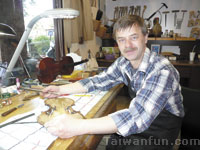
Stasevich handles the violins
like a doctor, feeling for the
pulse of the instruments and
restoring life.
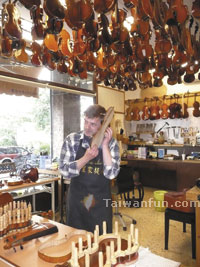
Russian violin/viola
maintenance expert Aliaksandr
Stasevich visited Taiwan to fix
hundred-year-old instruments,
giving them a second life.
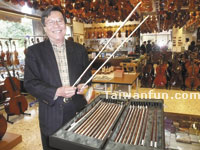
Taichung City Counselor Chen
You-jiang spent time with
Aliaksandr throughout his trip
to Taiwan, allowing them to
become good friends. They
both agreed that good
teamwork is like a good violin
with the right bow; together
the two can provide a
wonderful performance.
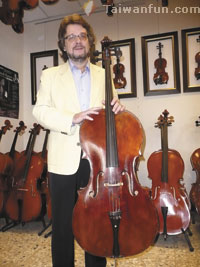
Tunghai University Music
Professor Arkadi Kuchynski
and Russian music instrument
"doctor" Aliaksandr Stasevich
greeted each other in Taiwan,
as they cooperated to give old
violins a new life.
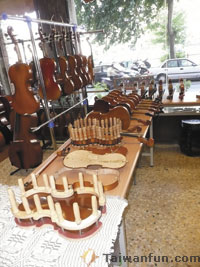
Vintage violin repair expert
Aliaksandr Stasevich enjoyed a
memorable time in Taichung.
|
Violin maintenance expert Aliaksandr Stasevich visits Taichung
Words and photos by Taichung City Government
Translated by Ann Lee
Aliaksandr Stasevich received his master's degree in music but is also a nationally-certified violin/viola tuning and maintenance specialist. A native Russian, he recently he flew to Taiwan and made Taichung city his first stop. During his career, he has done restoration work on over 100 violins and violas, using ancient techniques stretching back hundreds of years to bring these instruments back to top-notch condition. During his trip to Taichung, he worked on musical instruments with some Taiwanese violin specialists.
Stasevich noted that he had traveled to Taiwan once before about 17 years ago, and decided to return because his Russian schoolmate Arkadi Kuchynski, was now a music professor at Tunghai University. Although both studied strings and orchestra in school, Kuchynski decided to teach and perform, while Stasevich went into the world of instrument repair.
Besides Kuchynski, Sasevich also met with local violin collector Peng Jing-kai. Because both men shared a passion for the same musical instrument, Peng asked Kuchynski to formally invite a real expert to maintain his Taiwan collection. After his long journey to Taichung, Stasevich's eyes lit up as soon as he saw Peng's violins, and he immediately started his work on them.
Taichung City Councilor Chen You-jiang made the foreign guest feel right at home, ensuring that he felt comfortable with local culture and life. This included introducing tasty local delicacies, notably stinky tofu. While most foreigners have a difficult time with its smell, Stasevich really enjoyed the odoriferous treat, and insisted on sampling it every single day of his visit.
Stasevich's Russian hometown is much colder than Taichung, and this city's pleasant weather during his time here kept him in a good mood throughout. He took time to explore the streets, and was regularly greeted by friendly locals. This led him to comment that Taichung was a cultural town with many musical and artistic influences, and very friendly residents.
Nevertheless, the main reason for the 49-year-old violin repair expert's travel to Taiwan was the fact that hundreds of existing violins are today at least 200 years old. With the passage of time, they sustain damage or need re-tuning. That is Aliaksandr's mission, as he plays the role of a doctor, reviving these ancient instruments.
While musical repair specialists share the same technical expertise, Aliaksandr is unique in that he can also give an outstanding performance on the same instrument. He follows the hand-crafted musical instrument maintenance techniques of Italian violin-makers, passed down over 400 years. This is complicated by the fact that newer violins are made from a mix of different materials, unlike non-chemical materials used for old violins. Thus, he has to create repair techniques that won't damage the violin body or the sound of the instrument, a very challenging process that reveals his genuine expertise.
These instruments are an essential part of his life, as revealed when he first saw the violin collection after about a 30-hour flight. Upon arriving at the studio, his weariness seemed to disappear in an instant. Viewing a collection of 100 to 200 year old instruments awaiting repair, he described his passionate feelings as a "devotion to something you love" and noted that he was "expressing his love" through tuning the instruments.
During his Taichung stay, Aliaksandr had to dissemble entire violins, from the front side, made from pine wood, to the back side, made from maple. This piece-by-piece disassembly is even a more difficult than creating a new violin. Furthermore, the original glue used hundreds of years ago is unlike glues used today, not containing any chemical ingredients. Therefore, a similar vintage glue needs to be cooked and processed from ingredients like animal collagen and plants, enabling the old instruments to be tuned to their original standard.
Because he also is an expert violinist, Aliaksandr can "humanize" or "personalize" his tuning of these violins, giving a warmer, richer sound to the instruments. Throughout his Taiwan trip, his hands were like those of a magician, as if taking these ancient violins on a trip through time, re-awakening them from their long sleep. As he prepared to leave Taichung and return to Russia, he said that he would always have great memories of this beautiful city, filled with music lovers. |